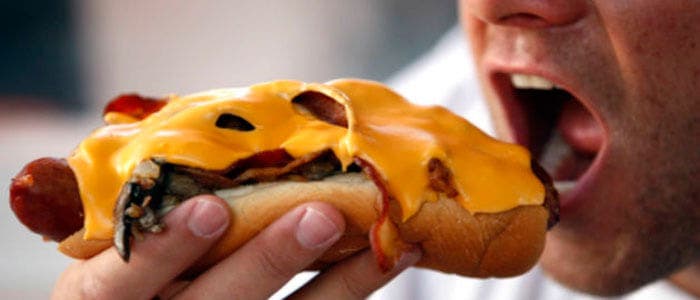Suffering from a food addiction can lead to different difficulties in daily life and of course, being overweight.
This activity consists of certain behaviors such as the habit of compulsive eating and lack of control over impulses. The medical society does not classify food addiction as a mental disorder, however,
Many people experience these symptoms occasionally and for a short period of time. Unfortunately, for others, these habits play a very important role in their nutrition and affect them greatly, causing weight gain and other harmful conditions.
So that you know more about this problem, we show you 7 common symptoms of food addiction so that you know how to identify and treat them.

7 symptoms of food addiction
1. Craving more food even on a full stomach
Food cravings are not totally crazy and they are not dangerous from time to time. However, there is a big difference between a craving and hunger , the former being the desire to eat something even when your stomach is full of food; while the second only responds to a basic task to survive.
Cravings become a problem when they happen too often and the task of satisfying or ignoring them presents a challenge. For this reason, some experts affirm that these behaviors may be the indication of an addiction or developing eating disorder (Gearhardt, Phil, White and Potenza, 2011).
A study on the same topic found that cravings in those cases do not work from a need for nutrients or energy, but rather a request from the brain to release dopamine, a chemical that participates in the way humans they feel pleasure (Bello and Hajnal, 2010).

2. Eat much more than expected
Maybe you are a person who can eat a piece of chocolate and save the rest for another time, but those who suffer from a food addiction cannot. Research ensures that this type of “all or nothing” behavior with respect to food is very common in any type of addiction (Schulte, Joyner, Potenza, Grilo & Gearhardt, 2015).
It is for this reason that advising moderation to someone with a food addiction does not make sense, since the lack of this behavior is difficult to resolve and requires treatment.
3. Make up excuses to eat
Even in healthy people and without any food addiction it is difficult to behave faithful to a diet, since the brain is always looking for a way to get what it wants. This is even more serious in those who suffer from a food addiction , since, even if rules and conditions are established about prohibited and allowed foods, the brain will always look for a way to reverse them in their favor.
Also, when the body feels deprived of food it begins to experience withdrawal, a feeling similar to when a person stops smoking.

4. Establish rules destined to fail
Most likely, when there is a lack of self-control, that person will establish a series of rules for himself to try to limit his addiction. Unfortunately, this action often fails because they are not durable in the long term.
Some of these rules can be to have 1 or 2 days a week where you can eat without regrets and rules, or eat junk food only during celebrations and parties.
5. Hide food addiction
When compulsive behaviors start to get out of control and people cannot take control of their actions with regard to food, it becomes common behavior to hide the consumption of excess food .
This usually occurs alone, separate from any contact with close family or friends.
6. Feeling guilty but repeating the behavior
The constant prohibition of food and behavior that violates those rules leads to a feeling of guilt for the person concerned. Still, food cravings and cravings can overcome regret to continue unhealthy behaviors. This creates a vicious cycle of guilt followed by momentary satisfaction.

7. May aggravate pre-existing conditions
The food that enters your system affects you directly and no one can deny it. This means that the impact of a poor diet will be clearly seen on your skin, weight, breath, fatigue, dental health and other similar problems.
Also, various diseases such as type 2 diabetes, heart conditions, dementia, Alzheimer's, and some types of cancer can be caused by a junk-food diet. Therefore, it is necessary that who suffers from any of these diseases and suffers from an addiction to food begin some type of treatment that can generate improvements.
conclusion
The best recommendation when it comes to food addictions and how to treat them is to visit a doctor and a nutritionist who can cope with this task. The path to a healthy diet is arduous and difficult due to the obstacles involved, but it is possible to reach your goal with the right help.
References
- Bello, NT and Hajnal, A. (2010). Dopamine and binge eating behaviors. Pharmacology, biochemistry, and behavior. doi: 10.1016 / j.pbb.2010.04.016
- Gearhardt, AN, Phil, M., White, MA and Potenza, MN (2013). Binge Eating Disorder and Food Addiction. Current drug abuse reviews. vol. 4 (3): 201–207.
- Schulte, EM, Joyner, MA, Potenza, MN, Grilo, CM and Gearhardt, AN (2015). Current considerations regarding food addiction. Current psychiatry reports . doi: 10.1007 / s11920-015-0563-3.